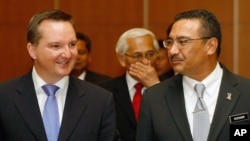Colleges in Australia have criticized new visa arrangements for international students. Canberra says the measures will make it easier for young foreigners to study in Australia following a decline in overseas enrollments.
Australia's Immigration department is reducing the assessment levels or minimum entry requirements for foreign students from 29 countries, including India, China and Indonesia.
The new measures follow recommendations from last year’s government review that studied the sharp decline in international student enrollments in recent years.
In 2011, foreign student enrollments dropped by as much as a third, spurred in part by the loss of large numbers of students from India. The drop from India followed a series of high-profile attacks against Indian students.
The declining enrollments were made worse by the strong Australian dollar, which has made courses more expensive for many foreigners. There were also problems with tough immigration policies, which makes it more difficult for international students to obtain permanent visas to work in Australia after graduation.
Australian Immigration Minister Chris Bowen says those arrangements have now been relaxed.
“We require people to have an amount of money saved to show that they can maintain themselves in Australia. When an assessment level is reduced, that reduces the amount of money that they need to have saved and often reduces the amount of time that it needs to have been saved," said Bowen. "So I've announced a reduction in assessment levels, and they vary from country to country. I've announced a reduction for 29 countries and that will be effective on the 24th of March.”
However, many colleges remain unhappy. They insist that the changes do not go far enough and want the government to do more to attract foreign students by relaxing visa rules even further.
Sarah Logan, the deputy principal of the Strathfield College, a vocational education and training institute in Sydney, says the new rules are still too stringent. But she also says there are broader problems facing the education industry, despite its attempts to lure back students.
“We've kept the same standards, we maintained our continued improvement processes, and we've been audited," she said. "You know we're doing everything right. We're improving all our quality across the board. However, the students are just not there. Now, I don't think it is just the visa assessment levels, themselves. I do think there are a number of other factors in this, and that the GFC [global financial crisis] is definitely one of them.”
The the Global Financial Crisis, has affected many Australian industries in recent years. The international education sector is Australia's third largest export earner, behind iron and coal. The industry generates about $18 billion a year, but all parts of the sector, universities, vocational training institutes and English language colleges, have seen overseas enrollments slide in recent years.




